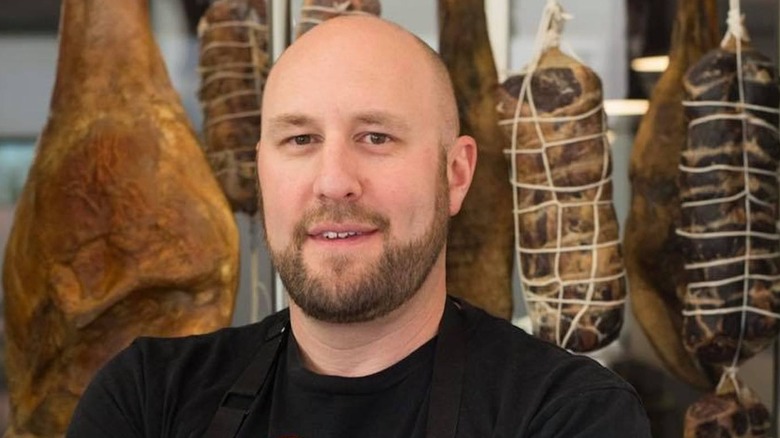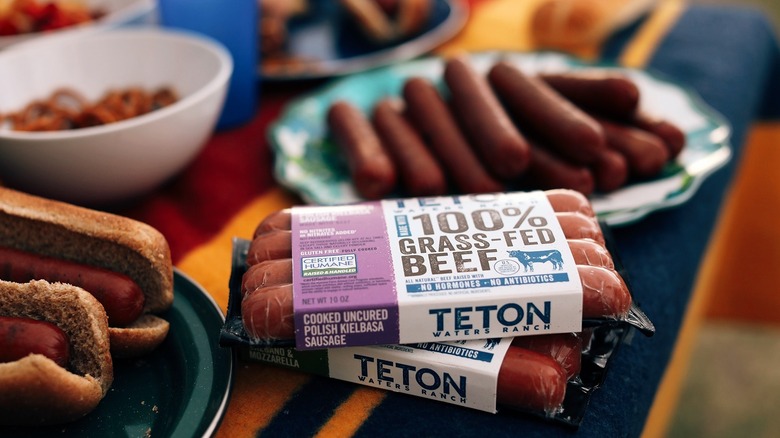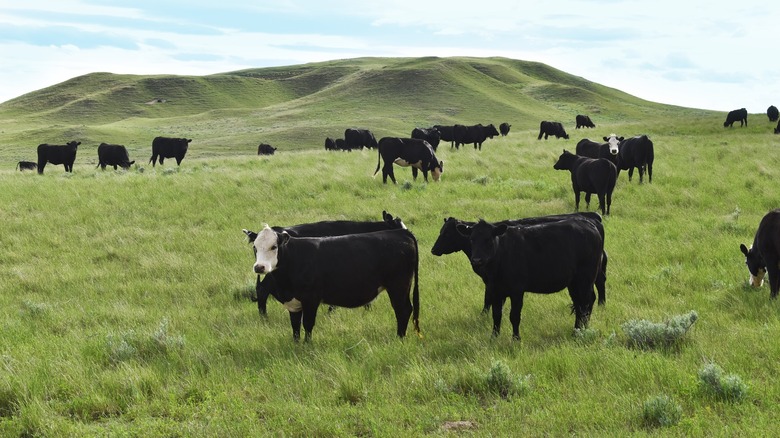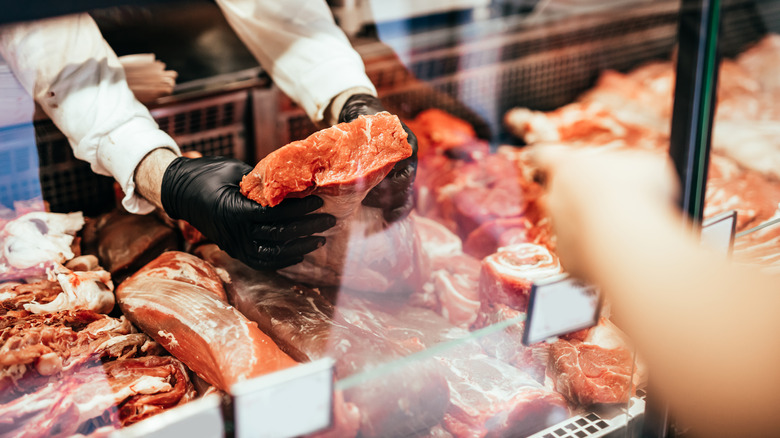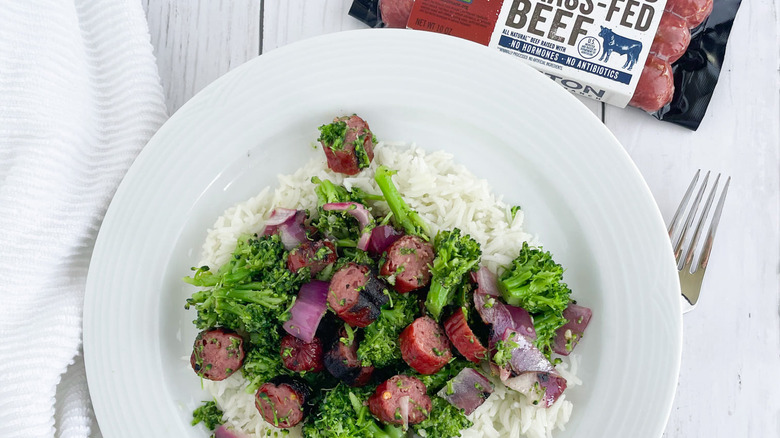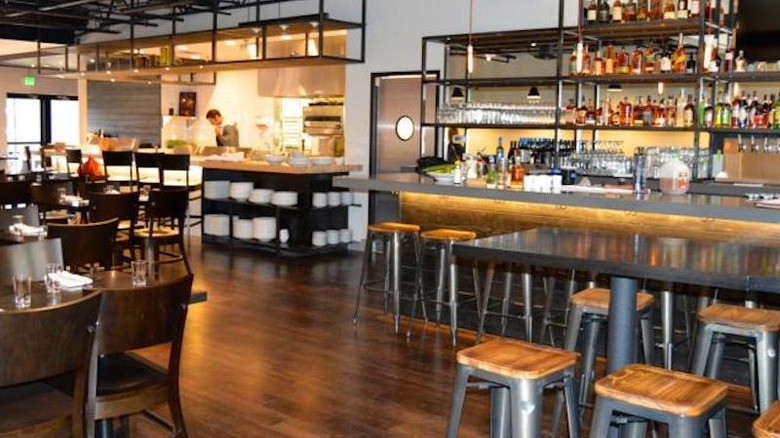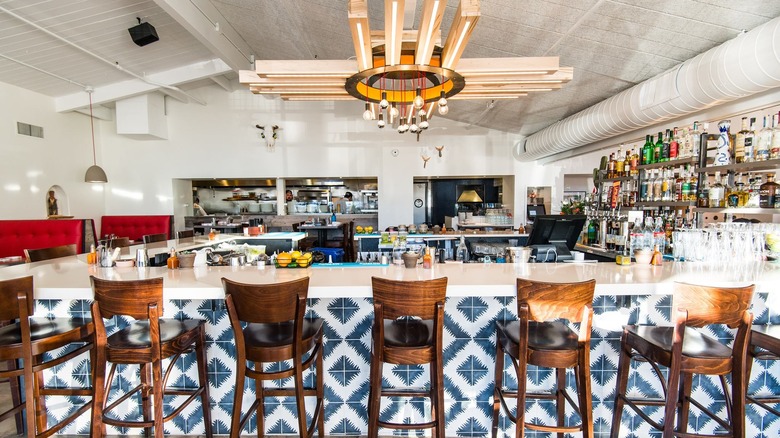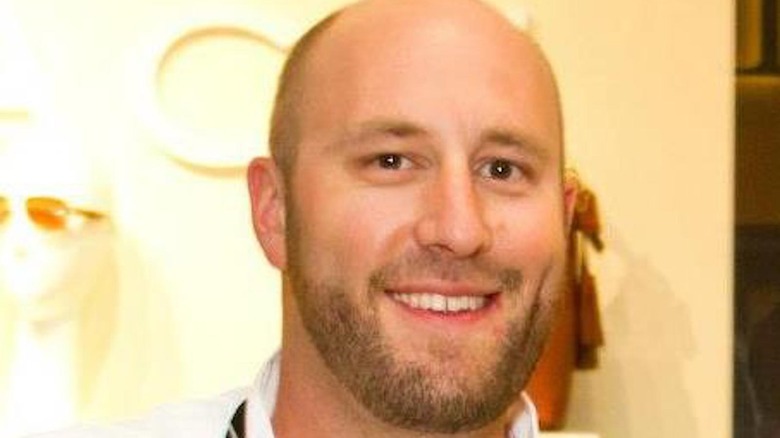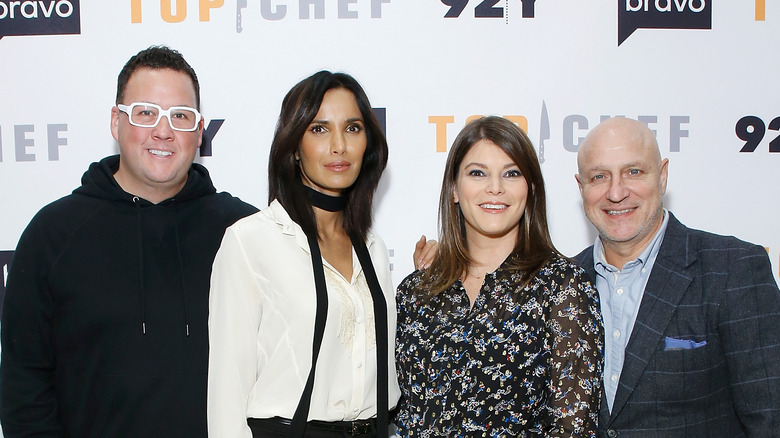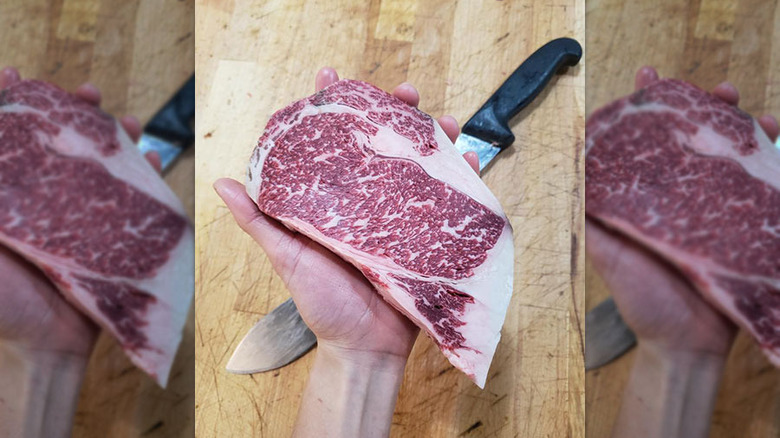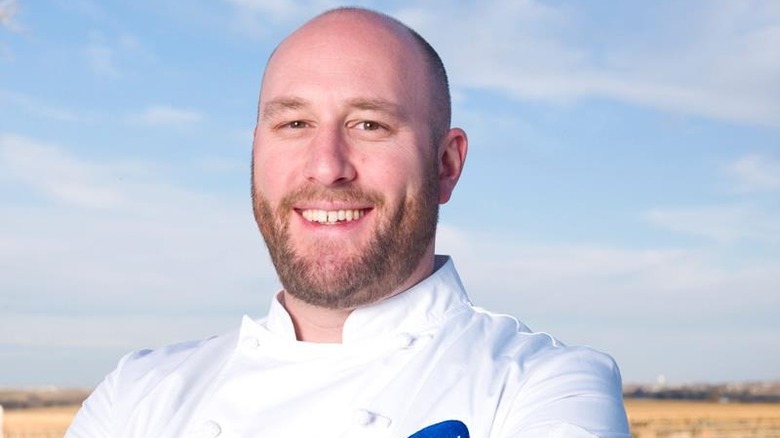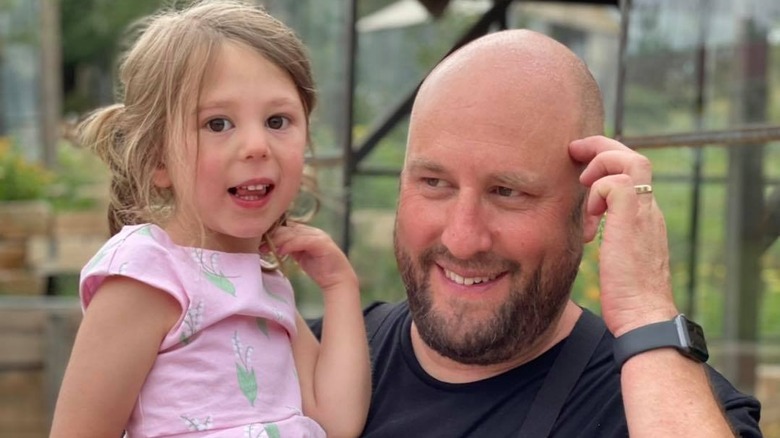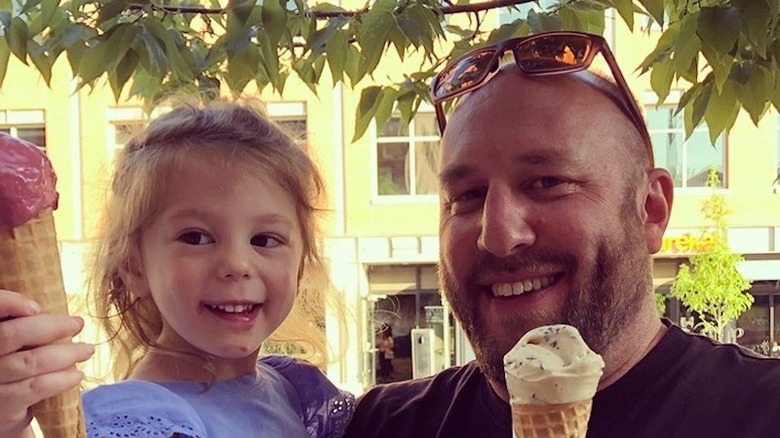Chef Hosea Rosenberg Talks Top Chef And Sustainable Beef - Exclusive Interview
Chef Hosea Rosenberg's cooking style can best be described as three things — local, seasonal, and sustainable. The "Top Chef" champion has used his success to open two restaurants (one complete with its own butcher shop) that embody that style, along with his deep-rooted Southwestern flare. Now, he's trying to help us all cook and eat more sustainably. Rosenberg recently teamed up with Teton Waters Ranch, which makes certified humane, 100% grass-fed beef hot dogs, sausages, and burger blends, to help demonstrate how a sustainable approach to farming makes for a better plate of food, whether you're in a restaurant or your own kitchen.
Mashed spoke exclusively with Rosenberg about the partnership and why it's so important to know where your food comes from. Plus, he gave his inside tips for buying and cooking better beef at home. Rosenberg also dished about his time on "Top Chef," and how life has changed since he walked away as the season five winner.
Hosea Rosenberg on his partnership with Teton Waters Ranch
Really excited to talk to you today about your partnership with Teton Waters Ranch. How did you get involved with this company and why did you decide to team up with them?
Well, I think they did reach out originally, but I think the reason was that we have a butcher shop here at Blackbelly. We sell a lot of meat, a lot of beef in particular, so we're very focused on sustainable, naturally raised quality beef products and that's their thing. So it was a good fit. And they sent us a bunch of samples to see if we would like it. And we did, we liked it a lot.
Their mission and their kind of intention with what they do is kind of something that we align with — that it's humane, they treat their animals well, that they care about what they raise and what goes into their ingredients, just like we do at the restaurant. So it was an easy thing to say yes to.
Teton Waters Ranch is very much an industry leader in this 100% grass-fed beef and certified humane cattle ranching, what does that mean?
It really boils down to the ingredients in the food. So we have that same philosophy here at Blackbelly where we don't put things on the plate just because they're cheap. We put things on the plate because they... Well, number one, it has to be delicious. And I do think that their products are really tasty. But secondary to that is that the animals are treated well. They're humanely raised. They have proof that it's not just buzzwords, like "all-natural" or whatever. They actually can show how their animals were treated, what they were fed, how they were raised, where they were pastoring. Grass-fed is just a really great thing because it's definitely a more sustainable way to raise cattle. So we really liked their story and we liked what they were all about, so we thought it would be a great partnership.
Hosea Rosenberg on why sustainable beef is better
You mentioned sustainability — Teton Waters says that this is obviously about the treatment of animals, but it's also about improving the environment. How are these things connected?
The short version is for one, they're not bringing in grain for their animals, which can have a huge impact on the environment. Let's be honest, to be true zero impact, none of us would eat meat at all. I feel very strong about our impact on the world and I have a butcher shop. So clearly we're not vegan over here. So if we're going to eat meat, let's eat the best meat we can possibly eat. And one of our mottos here at the restaurant is we don't expect people to eat a lot, just eat the meat that would have the least impact on the planet that you can.
And so what [Teton Waters Ranch does] with the grass-fed beef is they're not making somebody else work for the food that the animals are eating. They're on the land that is producing the same product that they're eating. So there's less transport, less oil being used up. They're actually doing what they're naturally supposed to do, which is just eat grasses that they're moseying around on. And that to me says a lot about their focus as a company, their mission.
As a consumer and a home cook, why should this matter to us?
Well, because we all live on the same planet. We're all dealing with the effects of climate change and every decision, every dollar that we spend impacts the world in one way or another. So again, if you are using your conscience in your purchasing, then hopefully you're doing something a little bit better.
As I said, if we all turned vegan and grew our own produce in our backyard, the world would probably be in a much better place. Short of convincing every single human being to plant their own food and eat it, you've got to make sustainable choices. And if you can do a little bit of research into the products that you're buying with your own money, then hopefully you're making good choices, and it's not just about the price.
Is it healthier for you to eat 100% grass-fed beef?
It definitely has less saturated fat. There is some research saying that you're going to have less cholesterol, less saturated fat in grass-fed beef than grain-fed beef because the whole point of the grain-fed or grain-finished beef is to make them fattier. So if you're eating grass-fed beef, it's probably leaner, which means you're probably going to have less cholesterol. So yes, in short it is better for you.
Hosea Rosenberg on how to shop sustainably
From a journalist standpoint, I've very much seen in recent years this shift of consumers caring more about where their food comes from and especially their meat. Is that something that you're seeing as a chef and a business owner?
Absolutely. It's been something that's been a driving mission for us because every ingredient on our plate came from somewhere, and if we can explain where all those ingredients came from, or at least most of those ingredients, people really appreciate that. And they don't mind paying a premium for something if they understand why it costs what it costs. We're not just going to charge more for our beef because we're fancy people and make fancy food. We support ranchers who treat the animals the way we expect them to treat them. And if that means paying a little bit more for sustainably raised grass-fed beef, then let's pay that money. And let's hope that our customers appreciate those decisions.
What is the best way for consumers to get the information that they need in terms of buying humane and quality beef, and what factors should they be looking for?
Well, I mean the easiest answer is the internet, right? And you can find anything you want on the internet these days, but if you're buying a product from someone, they should have their information out there on the web for you to find. So if you go to Teton Waters' web page, they explain where all their beef comes from and they talk about their impact on the world and their whole mission and what they're trying to do. And I think that's true for anything. I think everyone should know where their food comes from.
So here at Blackbelly, we can tell every customer that comes in and buys our food where everything came from. We know the farmers who grew the produce, we know the ranchers who raised the meat that we sell. And if we didn't get it locally, we were honest about that. We tell everybody that we're not buying local olive oil here but we're buying really good organic olive oil to cook with our food. And so again, with a company like Teton Waters, they have a very good website that explains where their beef comes from and how it's raised and what they do to get the product into the store.
Hosea Rosenberg shares his latest recipe creations made with Teton Waters Ranch beef
Part of this partnership with Teton Waters Ranch involves curating recipes with their products. Can you share some teasers with us about some of the recipes you're going to be developing?
We've already done a few. They actually posted a picture the other day of this broccoli, this grilled broccoli and sausage, a kind of side dish that we came up with. It was really good. We've done some like savory pancakes that sound a little different. It's like a sausage and cheese pancake.
We're about to do Frenchie On A Rug, which is something that we do in our catering business. It's like a play on a pig in a blanket, but it's puff pastry kind of done in a little circle, and then you do a slice of the sausage. We have a French bulldog so we call it a Frenchie On A Rug. It's got apricot mustard on it. We also did this grilled veggies stack. It's one of their veggie patties that has beef and vegetable and mushrooms. Just like a loaded burger with an olive tapenade on it, just super tasty.
Hosea Rosenberg dishes on his restaurant and butcher shop, Blackbelly
The menu at your restaurant, Blackbelly, is very unique and it's very eclectic. Where do you draw the inspiration from to create the dishes?
The menu is based on the fact that we have a butcher shop next door. So we start with these animals and we're bringing in whole pigs, whole cows, whole lamb. So we're trying to feature those on the menu, and use everything nose-to-tail. Wrapped into that is seasonality. We try to be a hyper seasonal restaurant so we work with a lot of local farmers as well. We're trying to highlight the bounty of the season with these amazing animals we're getting in.
Our cuts of beef change every single night, depending on what part of the animal we've been using. We also try to use a lot of the off parts. So we have pig ears on our menu, we have bone marrow, we have beef tartare, we have all these great products that highlight ... trying to be full utilization and trying to be as sustainable as we possibly can knowing that we're a restaurant and restaurants aren't necessarily as sustainable as I said, as like just growing your own food and making it at home. But if you are going to go out to eat, we want to be a business that is having the best possible impact on the environment and on the world as we can. And that means eating every part of the animal. That's kind of what makes our menu exciting. People that have never had pig ears, they end up ordering it every time they come back because they're so good. That's something that they never would have thought of eating before coming into our restaurant.
Hosea Rosenberg on New Mexican food and his second restaurant, Santo
You also now have a second restaurant, Santo. What made you want to open this restaurant?
That is a simple question to answer. I grew up in New Mexico and I really miss that food that I was eating when I grew up and I didn't feel like there was a good place for it here. So I just started making lots of green chili and red chili, blue corn enchiladas and that's what we do over there. It's the food I grew up on.
What do you wish more people knew about New Mexican food in general?
Well, that it's not Mexico. That's the first thing. A lot of people don't know what New Mexico is all about. And it's a really interesting mixture of modern-day America with Mexico and the Spaniards who settled the land. Well, actually they conquered quite a few of the Indians that were there. So there's a mixture of Native American, Spanish, Mexican, and American cultures that have all kind of been mixed together and that's what the food is. And it's different than Mexican food. There's a lot of similarities, a lot of the same words, but it tastes a little bit different and the techniques are a little bit different. It's just its own unique place. And it's simple, it's homey, it's not fancy, but it's a lot of flavor. And the green chili and the red chili are like our lifeblood in New Mexico.
When people go to Santo, what are the dishes they have to try?
You have to have the enchiladas, that just kind of goes without saying. Those are the most popular dish on the menu. Really simple, but it's something that you see on every menu in New Mexico as well. And you get them smothered with red or green chili. We have chicken enchiladas. We have a vegetable enchilada, blue corn, lots of chili, super simple. Our salsas, our guacamole, our queso fundido, those are all really good starters. We sell a lot of margaritas because nothing goes better with that food like tequila. We have a great mezcal selection. The green chili cheeseburger is also probably our second most popular dish we have behind the enchiladas. Then we have a lot of great tacos on the menu as well. But if you're going to come in and have just one thing, I would say get the queso fundido and some salsa and then get the enchiladas.
Hosea Rosenberg gets real about Top Chef
I want to talk to you a little bit about your time on "Top Chef." What was that experience like? Are there any memorable moments that you can share?
Plenty. Well, the experience was really difficult. It's really stressful. It's one of the hardest things I've ever done professionally. But it definitely helped me advance my career, got me in front of people I never would've gotten in front of. Got me a lot of exposure. And it's also created a lot of connections for me. And even people that I wasn't on the show with, I've become friends with.
To me, the best part of it was meeting some of these hero chefs of mine, like Jacques Pepín, the man who gave me great advice. It was just really cool to be in the same kitchen with him, and cooking for these really famous people. My season was in New York City. So we were kind of around the best of the best. Jean George [Vongerichten] ... and just all these people who ... I don't feel like I would have cooked for in my career if it wasn't for that. So that was definitely the best part.
The hardest part was, it was incredibly stressful. We were sequestered for six weeks, we didn't have any contact with the outside world. They take your phone away, you're not allowed to be online, you can't listen to music, you can't watch the news, nothing. So you're just totally separated from reality for a very long time. That made it incredibly hard. Very surreal.
It's very mental. I tell people that a lot, that the people who make it to the top on that show, you have to have skills, you have to be a good cook, but you also have to be a good problem solver and really understand the challenges. It's not just being a great chef. It's being able to handle all this added pressure and the time restraints and all the rest of it. It's not just the cooking.
What are the most valuable lessons that you walked away with?
I say this to anybody who ends up doing the show — I've coached a couple of people before they go, they will reach out — do the food that got you there. It seems very simple and straightforward, but a lot of times people end up on the show and they think they have to prove something or they try something that they're not familiar with because they've seen other people on the show do that. We all have our own style, we all have our own training. Lean into your strengths. And more than anything, you have to keep your head on straight. A lot of people just panic, lose their minds while they're on the show. You have to stay levelheaded. And that's just a good lesson for life. As things come up, if you get really stressed out, you're not going to make good decisions.
You have to be able to calm yourself down. We have a 4-year-old daughter, Sophie. We try to tell her all the time, "Breathe, focus, calm down, stop crying. You're going to get through this." Something we tell our staff all the time here. You know, the nights get hard some nights. Running a restaurant is very, very stressful. You got to know that the day will end. It's going to be over soon. Calm down. Being on "Top Chef," same thing. And you may win, you may lose, but either way, you got to keep your head on straight.
Behind-the-scenes of Top Chef, according to Hosea Rosenberg
Do Padma Lakshmi and Tom Colicchio increase the intimidation factor? What's it like to cook for them?
So one thing that people don't realize on the show ... Tom, in particular, we barely saw him. We really only see him at the judges' table. Cause he's not there when you're cooking. He's not necessarily even there when you're plating. He might be in another room, sitting in the dining room but you're in the kitchen. So there were periods of time where we didn't even see his face. Padma on the other hand, she was doing all the quick fires and around more. So I felt like I knew her a little bit better during the show than I knew him. And he's the top chef, he's the judge. They're all judges, but at the end of the day, he kind of has the final say. And so with Padma, it was a little bit more fun and she would come into the studio and joke around with us.
She used to read our horoscopes off-camera. Because we never knew what was going on, so she'd read us the headlines of the news and tell us what was going on. And then read horoscopes. Tommy was very serious, you know? He had these like steely blue eyes and he was very intimidating. And as a chef, like he's more intimidating than Padma is. So it was always like, really tough. I got to know him a little bit better after the show, we did some events together and got to get to know each other a little bit. He's just a great person. But he was definitely the scariest one on the show.
You touched on this earlier, I want to give you the chance to elaborate. How has your life changed since being on "Top Chef"?
Well, it was a huge 180 right after the show. I mean, I went from being very anonymous. You know, I live in a small town, it's a city I guess, but it's a small city and wasn't really on any kind of stage whatsoever. And I didn't even really know what I was getting myself into when I did the show. I'm just competitive and I've done a lot of cooking competitions locally. And so to be on that show with them, it was a huge change. And especially after the show aired. Because you film and it's months before it ends up on TV. So you've kind of already gone through it in your own head. Then you've got to keep your mouth shut. You're not allowed to talk about it until it airs.
And so yeah. There was good and bad. The more you're out there, the more you're exposed to people's criticisms. So I definitely had my share of criticism, but it also gave me a lot of opportunities. I got invited to cook in other cities and even other countries and met great chefs. And so it just allowed me to have a little bit more control over what I did next. It gave me more leverage and it gave me more notoriety. And for that, I'm very thankful.
Hosea Rosenberg's tips for making great steaks
I can't let you go without getting some cooking insights from you. What do you think are the biggest mistakes that home cooks are making when it comes to cooking with beef?
Cooking beef? Well, I'll say like, you know, especially right now it's grilling season. We do a lot of fundraisers for our daughter right now. She's got this rare disease and we're doing this cooking demo last night. It was a zoom, kind of like we are right now. And I tell people this all the time. Don't move the meat around on the grill a lot. A lot of people are like, constantly poking and prodding and turning and flipping it. You've got to let the food cook and leave it alone. And obviously overcooking beef is a big scare. You don't want to overcook something. So you can always cook it more. So if you think it's done, take it off, let it rest.
So yeah. Let me rewind here. To be concise. A couple big pointers I'll give people for grilling or searing steaks is always let the meat get to room temperature before you cook it. It will cook better if it's not ice-cold, season well but don't overseason. There's two things you can always do more of. You can always add more salt and you can always add more heat. You can never take those things away. So if you overcook or you over salt, you're done.
Be patient. Let the grill cook the meat, don't keep moving it around. Cook one side and then cook the other side — you're done. And then a big thing for steaks, in particular, is you've got to let it rest after it's cooked. The general rule of thumb is however many minutes it was on the grill, that number divided in half is how long it should rest before you slice it. Steak doesn't need to be sizzling hot when you serve it. It should just be warm. The more you rest it, the better it'll be. It'll stay more juicy and more tender if you don't cut it up right after coming off the grill.
More cooking tips from Hosea Rosenberg
What do you think is an underrated cut of meat that we should cook or eat more of?
Well, we have a lot of those here at the restaurant. As I said, we get whole animals. So everybody knows the New York strip and the ribeye, but there's a lot of other lesser-known cuts. And a lot of those lesser-known cuts are like the bulk of the animal. There's a cut called the bavette. It's sort of off the shoulder, but it's one of my favorite cuts. It's really tender, it's got no gristle or fat cap on it, it's just really good marbled meat and it's really inexpensive. I love the flat iron. I love just sirloins in general. There's a lot of fun cuts. And if you have a butcher that you trust, go to the butcher and say, "Hey, is there something less expensive that will still be really marbled and really delicious?" The Denver cut is another really, really great one. So we serve a lot of these cuts that are sort of, like, second tier, if you will, but have just as much flavor at a much lower price point.
Any other just like go-to cooking tips or hacks that you want to share?
Another big thing I tell people all the time when you're cooking is get all your, what we call in the kitchen, mise en place — all your things in place. A lot of people are just in and out of their fridge the whole time where they're cooking. Get all your ingredients laid out, get everything ready, get yourself a cutting board, get some space to work, make sure you're working clean. Getting all your stuff out ahead of time is like a big one for people because they're just running around like crazy trying to find things when they're already starting to cook. So think about the beginning to end stages and make sure you have all your stuff out.
Hosea Rosenberg shares an update on his daughter, Sophie
I would love it if you'd like to talk a little bit about Sophie's neighborhood and the work that you guys are doing and how your daughter, Sophie, is doing in general.
She's doing great. She turned four just about a month ago and she's a sweet little girl. She's very funny, she's got a great sense of humor, she wants to dance and sing. She's dealing with an incredibly rare disorder. It's called MCTO. It's a genetic disorder that only 30 people in the world have ever been diagnosed with. And because of this, there is no cure, no treatment for what she has. And what it's doing, there's this one, it's literally one little protein in one gene that's the wrong letter and it's causing all these issues because of effectively what they call downstream effects. Like there's a problem in this one kind of center that creates all these proteins that build your body and her bones are being broken down quicker than they're being built back up. And what that does is make her bones disappear over time.
So all the little carpal and tarsal bones in your wrists and your ankles are the first to go. And that's why it's called MCTO. It stands for Multicentric Carpotarsal Osteolysis. Osteolysis is the breakdown of the bones. So her bones are disappearing, and it's already happened quite strong in her wrists and ankles. So she has to wear braces on her legs. And she sleeps in braces on her hands at night. Her hands are weak and she has trouble walking. She's very wobbly. She can't run, she can't jump, she can't ride a bike. But she finds other ways to have fun. And she's still upright. She's still on her feet, but she's just a little wobbly. Unfortunately, most of the kids that we've met that are older than her that have this are in wheelchairs. They can't really use their arms or legs.
And so our mission and our goal with this foundation is to find a cure or at least find some treatment that will slow or stop the disease. And it's really, really sad and it's really awful. And there are days where we're both very depressed, but we got to live in the moment, like I said, and she's happy and she's not in a lot of pain. And so we just live day to day and we just ... We're there with her in the present. Meanwhile, our foundation is raising lots of money for research and we've got this amazing scientific advisory panel. And we've got these researchers that are doing work right now in the lab, kind of studying the genetics of this, but this is a hard thing to figure out. All genetic disorders are really difficult and in particular, a rare disease, which this counts as a very rare disease, there's just no research money into it.
And so as parents — and we've met a lot of other parents of other kids that have rare disorders — it's on us. So we have to raise the money, the government's not going to help us. Medical institutions, insurance companies sure as hell aren't going to help us. So we have to do this on our own. And that's what we're doing. We're just raising money for our own child's future, which is not something we ever expected to do. And it feels really awful sometimes to have to beg people to help us out, but that's what we need. And any other parent, I think, out there would do the same if they were in this situation.
Hosea Rosenberg on the support Sophie's Neighborhood has received
Do you feel like you've seen a lot of support from your community and from the restaurant community?
Ton of support. And we got the news about her disorder ...we got the test done right before COVID shut down restaurants. So it was effectively the same week that we found out we were going to have to shut both of our restaurants down that we found out about what was going on with our daughter. We knew something was up for a long time, but that's when we got the actual [news]...it was the third time we had done a genetic test, but this was like the most. It was the best test, I guess. The most intensive one out there. And we didn't expect much from the restaurant community because we were all suffering from the effects of COVID. But a lot of other chefs and restaurant owners jumped in and reached out, and other "Top Chef" people, and Padma did some stuff, and Gail Simmons. We've just had a lot of national and local support from people.
We've done a lot of fundraising. And my wife, Lauren, has been the main driver of that. She's constantly doing things. Like this weekend is Sophie's ice cream social. She loves ice cream and so every July 19th, which is national ice cream day, we do this big fundraiser with a lot of other restaurants. And they just sell ice cream and then all the proceeds from their ice cream sales go to the foundation. And it's not a ton of money, but it's something that keeps the conversation going and makes sure that people know that we're out here and we can't let it fade away. I don't want somebody to donate a little bit of money and then never think about it again. We want them to think about it so they can help us get the word out. Because it's amazing, that chain of connection that we all have ... you never know when somebody out there is going to be helpful. So if we can keep the word out, be kind of loud about what we're up to, we may just reach the right people and miracles can happen that way.
You can find more information and donate to Sophie's Neighborhood here. And watch for more of Hosea Rosenberg's recipes with Teton Waters Ranch.
